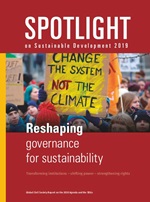Human rights and the governance of social protection
Published on Fri, 2020-02-07 08:23
Social protection, when properly designed, effectively prevents and reduces poverty and inequality highlight Sylvia Beales and Nicola Wiebe (Global Coalition for Social Protection Floors) in the Spotlight report. Guaranteed social protection supports improved nutrition and access to essential services and can therefore interrupt the vicious cycle of poverty and its intergenerational transfer. Universal access rights to social protection means that those at extreme disadvantage can be reached, which contributes to overcoming deeply rooted experiences of discrimination and exclusion, disempowerment and gender inequality. But currently only 29 percent of the global population count on comprehensive social protection over the lifecourse and for the different contingencies that may occur. Fewer than 16 percent of older people in low-income countries have a pension, with older women less likely than older men to receive one. The 2030 Agenda and its 17 interrelated goals are grounded in the Universal Declaration of Human Rights, international human rights treaties, the Millennium Declaration and the 2005 World Summit Outcome Document. The Agenda recognizes that economic growth alone misses those left furthest behind, and its transformative vision is to reach the furthest first, to leave no one behind, to empower the disadvantaged and to end poverty in all its forms everywhere by 2030. Social protection is key to accomplishing this vision and is mandated in SDG 1, target 1.3. When properly designed, social protection effectively prevents and reduces poverty and inequality. Guaranteed social protection supports improved nutrition and access to essential services and can therefore interrupt the vicious cycle of poverty and its intergenerational transfer. Universal access rights to social protection means that those at extreme disadvantage can be reached, which contributes to overcoming deeply rooted experiences of discrimination and exclusion, disempowerment and gender inequality. But currently only 29 percent of the global population count on comprehensive social protection over the lifecourse and for the different contingencies that may occur. Fewer than 16 percent of older people in low-income countries have a pension, with older women less likely than older men to receive one. The human rights framework sets out the moral and humanitarian imperative for social protection for all. Good governance based on this framework is essential to the effective delivery of social protection, necessary to unleash its transformative potential. Adherence to a human rights-based approach necessarily translates into a clear legal framework, transparency and accountability. It requires appropriate institutional capacity and coordination, and bottom-up participation of relevant stakeholders. It also requires global social governance coherent with 2030 Agenda commitments. By Sylvia Beales and Nicola Wiebe, Global Coalition for Social Protection Floors. Read this chapter here. » |
SUSCRIBE TO OUR NEWSLETTER



